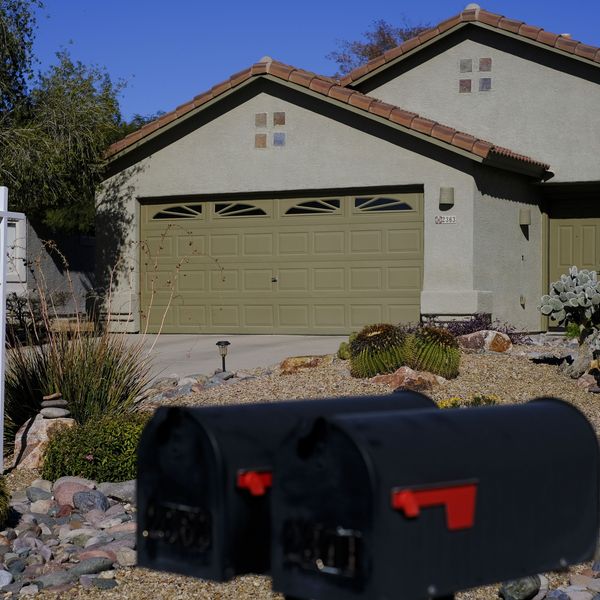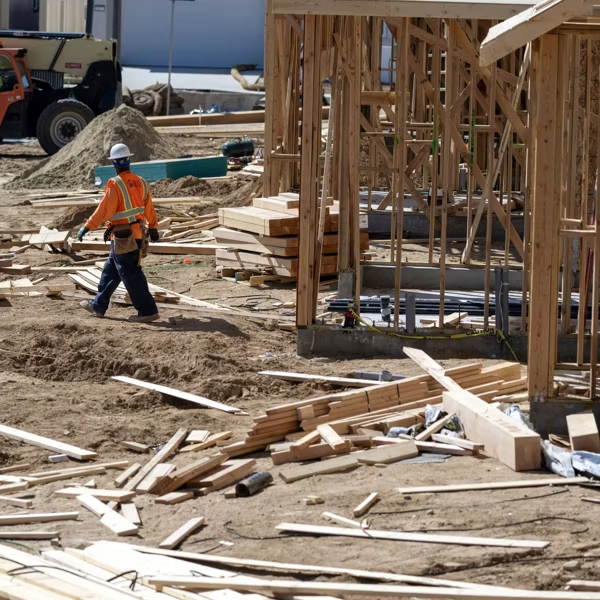US in Dire Need of Home Improvement
Floods ravage the Midwest, as the hodgepodge system of levees is overwhelmed. Twenty-four are dead; damage is estimated at $15 billion and counting. The cost to food supplies has yet to be felt.
A bridge falls in Minneapolis, killing 13 people. A 100-year-old sewage valve explodes in Manhattan, terrorizing residents and shutting down much of lower Manhattan. And New Orleans still hasn't recovered from Katrina.
America is literally falling apart. Our infrastructure is old, outmoded and wearing out. Roads, bridges, waters and sewage systems, the electric grid, broadband, airports, public schools -- all have staggering unmet needs. America has become a place of private wealth and public squalor.
The American Society of Engineers estimates that the United States will need to invest $1.6 trillion over five years to bring our infrastructure up to sensible standards. That's "trillion" with a T. The Congressional Budget Office estimates that, on water systems alone, the annual spending gap today is about $19.4 billion for infrastructure modernization, and $18.1 billion in operations and maintenance.
This is a national emergency. The disrepair and decrepitude of our public systems isn't simply aggravating; it is massively costly. Schools in disrepair make children think we don't care about their education. Crowded roads in disrepair cost Americans hours from their families or their work and rack up millions in damage to cars and bodies. Inefficient transport and communications makes American business less competitive in the global economy. If we want to maintain a high-wage economy, we have no choice but to sustain a modern infrastructure, a world-class education system and robust public research and development.
In 2000, the United States was celebrating a budget surplus. It was a time to make significant investments in our infrastructure and our people. Instead, Bill Clinton -- beleaguered by the Gingrich Congress -- called for paying down the national debt, at the time lower as a percentage of GDP than any other industrial nation. George Bush, of course, called for massive tax cuts, skewed primarily to the already wealthy. Bush won the election; the Democratic majorities in Congress bowed to his wishes.
Instead of building modern public schools, safe levees and bridges, or durable water and sewage systems, the money went disproportionately to the second yacht, the larger mansion, the private jet of the wealthiest Americans who were already pocketing most of the rewards of economic growth. Then came Iraq, and what Nobelist Joseph Stiglitz estimates will be about $3 trillion squandered in a war that should never have been fought.
For conservatives, this was a conscious and purposeful set of choices. They wanted to "starve the beast" of the federal government. They believed that top-end tax cuts would generate growth and the benefits would trickle down to others. They believed that Iraq would be a "cakewalk." Led by President Bush, the Republican Congress simply squandered the money without coming close to making the investments we need.
This is one of many challenges that the next president will inherit. The next president would be wise to stop spending $12 billion a month in Iraq and start spending it here at home. Speak frankly to Americans about the scope and depth of our needs; augment federal funds with loan guarantees to mobilize pension fund assets. And lay out a major program to rebuild America.
Or alternatively, we can pay far more because of washed-out communities, collapsed bridges, grid-locked citizens, badly educated students and workers, and corporations finding it increasingly hard to compete.
--Jesse Jackson
(c) Copyright 2008 Digital Chicago, Inc
An Urgent Message From Our Co-Founder
Dear Common Dreams reader, The U.S. is on a fast track to authoritarianism like nothing I've ever seen. Meanwhile, corporate news outlets are utterly capitulating to Trump, twisting their coverage to avoid drawing his ire while lining up to stuff cash in his pockets. That's why I believe that Common Dreams is doing the best and most consequential reporting that we've ever done. Our small but mighty team is a progressive reporting powerhouse, covering the news every day that the corporate media never will. Our mission has always been simple: To inform. To inspire. And to ignite change for the common good. Now here's the key piece that I want all our readers to understand: None of this would be possible without your financial support. That's not just some fundraising cliche. It's the absolute and literal truth. We don't accept corporate advertising and never will. We don't have a paywall because we don't think people should be blocked from critical news based on their ability to pay. Everything we do is funded by the donations of readers like you. Will you donate now to help power the nonprofit, independent reporting of Common Dreams? Thank you for being a vital member of our community. Together, we can keep independent journalism alive when it’s needed most. - Craig Brown, Co-founder |
Floods ravage the Midwest, as the hodgepodge system of levees is overwhelmed. Twenty-four are dead; damage is estimated at $15 billion and counting. The cost to food supplies has yet to be felt.
A bridge falls in Minneapolis, killing 13 people. A 100-year-old sewage valve explodes in Manhattan, terrorizing residents and shutting down much of lower Manhattan. And New Orleans still hasn't recovered from Katrina.
America is literally falling apart. Our infrastructure is old, outmoded and wearing out. Roads, bridges, waters and sewage systems, the electric grid, broadband, airports, public schools -- all have staggering unmet needs. America has become a place of private wealth and public squalor.
The American Society of Engineers estimates that the United States will need to invest $1.6 trillion over five years to bring our infrastructure up to sensible standards. That's "trillion" with a T. The Congressional Budget Office estimates that, on water systems alone, the annual spending gap today is about $19.4 billion for infrastructure modernization, and $18.1 billion in operations and maintenance.
This is a national emergency. The disrepair and decrepitude of our public systems isn't simply aggravating; it is massively costly. Schools in disrepair make children think we don't care about their education. Crowded roads in disrepair cost Americans hours from their families or their work and rack up millions in damage to cars and bodies. Inefficient transport and communications makes American business less competitive in the global economy. If we want to maintain a high-wage economy, we have no choice but to sustain a modern infrastructure, a world-class education system and robust public research and development.
In 2000, the United States was celebrating a budget surplus. It was a time to make significant investments in our infrastructure and our people. Instead, Bill Clinton -- beleaguered by the Gingrich Congress -- called for paying down the national debt, at the time lower as a percentage of GDP than any other industrial nation. George Bush, of course, called for massive tax cuts, skewed primarily to the already wealthy. Bush won the election; the Democratic majorities in Congress bowed to his wishes.
Instead of building modern public schools, safe levees and bridges, or durable water and sewage systems, the money went disproportionately to the second yacht, the larger mansion, the private jet of the wealthiest Americans who were already pocketing most of the rewards of economic growth. Then came Iraq, and what Nobelist Joseph Stiglitz estimates will be about $3 trillion squandered in a war that should never have been fought.
For conservatives, this was a conscious and purposeful set of choices. They wanted to "starve the beast" of the federal government. They believed that top-end tax cuts would generate growth and the benefits would trickle down to others. They believed that Iraq would be a "cakewalk." Led by President Bush, the Republican Congress simply squandered the money without coming close to making the investments we need.
This is one of many challenges that the next president will inherit. The next president would be wise to stop spending $12 billion a month in Iraq and start spending it here at home. Speak frankly to Americans about the scope and depth of our needs; augment federal funds with loan guarantees to mobilize pension fund assets. And lay out a major program to rebuild America.
Or alternatively, we can pay far more because of washed-out communities, collapsed bridges, grid-locked citizens, badly educated students and workers, and corporations finding it increasingly hard to compete.
--Jesse Jackson
(c) Copyright 2008 Digital Chicago, Inc
Floods ravage the Midwest, as the hodgepodge system of levees is overwhelmed. Twenty-four are dead; damage is estimated at $15 billion and counting. The cost to food supplies has yet to be felt.
A bridge falls in Minneapolis, killing 13 people. A 100-year-old sewage valve explodes in Manhattan, terrorizing residents and shutting down much of lower Manhattan. And New Orleans still hasn't recovered from Katrina.
America is literally falling apart. Our infrastructure is old, outmoded and wearing out. Roads, bridges, waters and sewage systems, the electric grid, broadband, airports, public schools -- all have staggering unmet needs. America has become a place of private wealth and public squalor.
The American Society of Engineers estimates that the United States will need to invest $1.6 trillion over five years to bring our infrastructure up to sensible standards. That's "trillion" with a T. The Congressional Budget Office estimates that, on water systems alone, the annual spending gap today is about $19.4 billion for infrastructure modernization, and $18.1 billion in operations and maintenance.
This is a national emergency. The disrepair and decrepitude of our public systems isn't simply aggravating; it is massively costly. Schools in disrepair make children think we don't care about their education. Crowded roads in disrepair cost Americans hours from their families or their work and rack up millions in damage to cars and bodies. Inefficient transport and communications makes American business less competitive in the global economy. If we want to maintain a high-wage economy, we have no choice but to sustain a modern infrastructure, a world-class education system and robust public research and development.
In 2000, the United States was celebrating a budget surplus. It was a time to make significant investments in our infrastructure and our people. Instead, Bill Clinton -- beleaguered by the Gingrich Congress -- called for paying down the national debt, at the time lower as a percentage of GDP than any other industrial nation. George Bush, of course, called for massive tax cuts, skewed primarily to the already wealthy. Bush won the election; the Democratic majorities in Congress bowed to his wishes.
Instead of building modern public schools, safe levees and bridges, or durable water and sewage systems, the money went disproportionately to the second yacht, the larger mansion, the private jet of the wealthiest Americans who were already pocketing most of the rewards of economic growth. Then came Iraq, and what Nobelist Joseph Stiglitz estimates will be about $3 trillion squandered in a war that should never have been fought.
For conservatives, this was a conscious and purposeful set of choices. They wanted to "starve the beast" of the federal government. They believed that top-end tax cuts would generate growth and the benefits would trickle down to others. They believed that Iraq would be a "cakewalk." Led by President Bush, the Republican Congress simply squandered the money without coming close to making the investments we need.
This is one of many challenges that the next president will inherit. The next president would be wise to stop spending $12 billion a month in Iraq and start spending it here at home. Speak frankly to Americans about the scope and depth of our needs; augment federal funds with loan guarantees to mobilize pension fund assets. And lay out a major program to rebuild America.
Or alternatively, we can pay far more because of washed-out communities, collapsed bridges, grid-locked citizens, badly educated students and workers, and corporations finding it increasingly hard to compete.
--Jesse Jackson
(c) Copyright 2008 Digital Chicago, Inc

